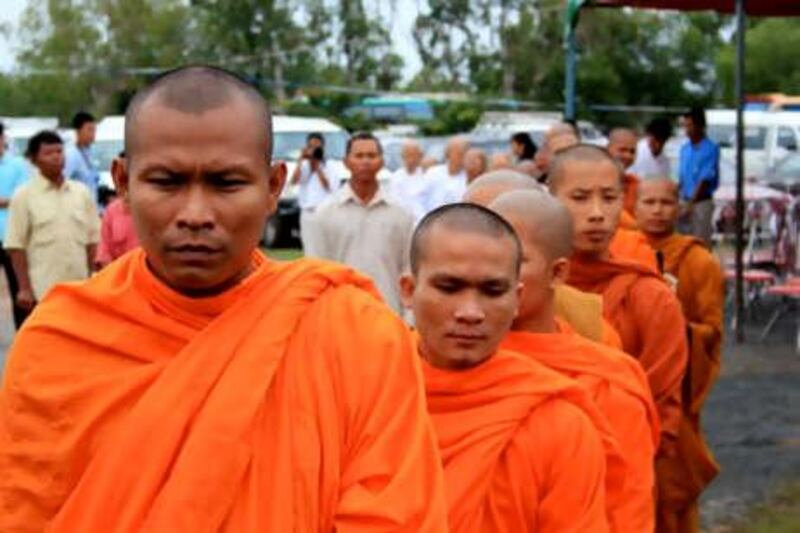PHNOM PENH // Not one of the 500 seats in the gallery was empty. The saffron robes of Buddhist monks splashed colour into the crowd of foreign diplomats, expatriate Cambodians and villagers. All had travelled to this courtroom on the outskirts of the capital to hear the first verdict to be handed down in an international trial of a Khmer Rouge official.
Behind the bulletproof glass, the defendant, Kaing Guek Eav, known by his revolutionary name, "Duch", stood to hear his sentence. In his lilac, button-down shirt and closely cropped grey hair, the diminutive former torture chief listened impassively. Three decades after the fall of his "Killing Fields" regime, he had been found guilty of war crimes and crimes against humanity. It was a landmark ruling by the UN-backed tribunal, but the sentence drew mixed reactions yesterday, as many Cambodians welcomed the guilty verdict but were enraged that Duch would only serve 19 years of his 35-year sentence.
"I can't accept this. My family died," said Saodi Uch, 46, who broke down in tears outside the courtroom. "I'm the only one left." Duch was found guilty of war crimes and crimes against humanity for his role as head of the Tuol Sleng prison. The prison, also called S-21, was a former high school that became a killing and torture factory during the Khmer Rouge's reign. During his trial, Duch, a former maths teacher, admitted to overseeing the death more than 12,000 people. Some estimates place the death toll as high as 17,000. At least 100 people bled to death in medieval-style medical experiments.
Duch was sentenced to 35 years, but that was reduced by 16 years after he received credit for time served and what the tribunal ruled was illegal detention by the Cambodian government when he was first detained in 1999. "What is unacceptable is to envision him as a free man even for one minute in the public sphere," said Theary Seng, whose family members were killed by the Khmer Rouge. "He should be receiving many life sentences."
Duch, 67, is the first of the former Khmer Rouge cadre to be convicted. The regime is blamed for the death of 1.7 million Cambodians - about one-quarter of the country's population at the time - by executions, starvation, medical neglect and exhaustion in labour camps between 1975 and 1979. Four other senior members of the regime are expected to begin trials in the next year. All four are elderly and have health problems.
Duch is the only one of five detainees to admit responsibility for killings during the regime's four-year rule, during which it attempted through draconian measures such as deportations and forced labour to create a purely agrarian Communist society. With no stipulation for the death penalty under tribunal rules, the prosecution had asked for a 45-year sentence but judges granted a degree of leniency based on mitigating factors including Duch's admission of guilt and co-operation with the court.
Duch's defence rested upon admitting his role in Khmer Rouge killings and co-operating fully with the court. During his first speech to the tribunal last March, Duch asked forgiveness from his victims. But one of his former employees suggested that Duch had feigned remorse. "I think Duch has a lot of tricks," said Him Huy, a former S-21 prison guard, in a telephone interview from his home in Kandal province. "He confessed because it's his only choice to get a shorter sentence."
Many Cambodians were angered at the thought of Duch's not dying in prison. "He killed many people, so why only 19 years?" asked a villager in Banteay Meanchey province. "During the Khmer Rouge most of my family was killed. " The villager, who asked to remain anonymous, attended a live screening of the verdict at a pagoda in her village. It was one of seven screenings in rural areas put on by the Documentation Centre of Cambodia (DC-Cam).
Savina Sirik, project co-ordinator of DC-Cam, said her organisation was unable to accommodate the requests from across the country asking for help to attend the verdict. So the group decided to hold events in seven provinces, which were each attended by about 200 people. In one district in Pursat, she said, statistics suggested that only five of the 700 families from the Khmer Krom minority survived the Khmer Rouge.
The regime targeted the community because members had migrated from the Mekong Delta in Vietnam during the 1920s, and the Khmer Rouge were virulently anti-Vietnamese. It was Vietnamese-backed forces that finally removed the Khmer Rouge from power in 1979 and ignited a civil war that lasted until 1998. Back at the tribunal, one of only a handful of prisoners to survive S-21 railed against what he considered a light sentence.
"Millions of people were killed, millions of dollars have been spent [on the tribunal], but the killer could be released," said Chum Mey, wiping his eyes as he spoke to reporters. "My tears drop again." Lawyers for the prosecution, however, said they were satisfied with the sentence. "This is a court case, not a football match, so there are no winners or losers," said the deputy prosecutor, William Smith.
"The most important thing is that judgment meets international standards of justice." He added that the prosecution may appeal for a stiffer sentence. The prosecution is building cases against an additional five suspects, but the prime minister, Hun Sen, has said he would rather see the court fail than expand the scope of prosecution. Observers have warned of political interference in upcoming trials, as some former Khmer Rouge members are now high-ranking officials in the Cambodian government and may be worried that information emerging from further testimonies could damage their reputations.
@Email:foreign.desk@thenational.ae





